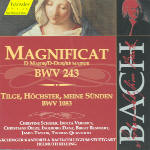Bach’s Magnificat radiates spiritual joy and compositional daring, qualities Helmuth Rilling broaches but never quite embraces in his new recording of this popular work. This is particularly apparent in the big choral movements, which are admirably transparent yet often lacking in dramatic heft. One glaring case in point occurs in the “Fecit Potentiam”, where Rilling’s slight ritard before the diminished chord on the word “superbos” minimizes its shock. The solo movements, however, offer much to admire. Tenor James Taylor (not the songwriter, folks!) projects “Deposuit Potentes” with red-blooded ardor, and Thomas Quasthoff brings lovely, florid resonance to “Quia fecit”. Christine Schäfer floats the gorgeous “Quia respexit” in alluring cahoots with the oboe d’amore soloist. Notable too is the delicate “Suscepit Israel” sung by the women soloists instead of the usual female choral voices.
The remainder of the disc is filled out by curiosities, including a setting of the “Suscepit Israel” adapted by from Caldara’s Magnificat, and a full-scale reworking of Pergolesi’s Stabat Mater. The Italian composer’s relatively chaste textures are fattened up via Bach’s denser polyphonic mill, with certain sections varied, repeated, and reordered as Bach saw fit. In addition, Pergolesi’s original Latin setting is sung to a related but different Psalm text in German. As with Mozart’s reorchestration of Handel’s Messiah, the Bach/Pergolesi Stabat Mater reveals more about the arranger than the originator. Rilling makes as convincing a case as he can for this oddly compelling hybrid, as do his heartfelt soloists, soprano Christiane Oelze and alto Birgit Remmert. Bach scholar Christoph Wolff’s annotations are models of scholarship and clarity, and Hänssler provides welcome multi-lingual texts and translations.
































